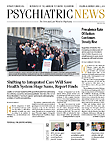Researchers in the Department of Psychiatry at the University of California at Los Angeles (UCLA) led a study to determine if pharmacotherapy combined with family-focused treatment (FFT) is more effective than pharmacotherapy with brief psychoeducation in reducing symptoms associated with bipolar disorder in adolescents. The study was published March 14 in AJP in Advance.
“We have been studying family interventions in bipolar disorder for many years,” said David Miklowitz, Ph.D., lead author and director of the Children and Adolescent Mood Disorders Program at UCLA. Miklowitz explained to Psychiatric News that approximately 50 percent to 65 percent of patients with the highly recurrent mood disorder have their first episode before they reach age 18.
Though mood disorder experts—including Miklowitz—have found FFT to be an effective adjunctive therapy to mood-stabilizing medications in adults with bipolar disorder, research validating this effect in adolescents has been plagued by limitations, including small sample size and lack of standardization of pharmacotherapy regimens. It was Miklowitz’s goal in the current study to address these limitations.
Miklowitz and colleagues recruited 145 adolescents aged 12 to 18 with bipolar disorder who had experienced a manic, hypomanic, depressive, or mixed episode—based on DSM-IV-TR criteria—within the three months prior to study initiation. Participants were randomly assigned to receive either combined pharmacotherapy with nine months of FFT or pharmacotherapy with three weeks of psychoeducation. The effectiveness of the therapies was determined by the reduction of bipolar-associated symptom severity, recovery time from bipolar episodes, and incidence of episodes.
After one year, the researchers found no significant differences in the reduction of bipolar-associated symptom severity, recovery time from episodes, or recurrence of episodes among the treatment groups. However, assessments at the two-year follow-up showed that adolescents receiving combined pharmacotherapy and FFT were more likely to have less-severe manic symptoms than those receiving pharmacotherapy with brief psychoeducation. The researchers found no significant difference in recovery time and recurrence of episodes among the two cohorts.
Miklowitz said that these findings suggest that the effect of “FFT on early recognition of prodromal signs of recurrence and communication and problem-solving skills may not translate into benefits for patients until families have implemented these strategies during new cycles of illness. In other words, patients and families may need time to incorporate the relapse-prevention strategies emphasized in FFT.”
Miklowitz concluded that intensive family interventions may be most useful for adolescents with bipolar disorder when family-associated stress is elevated or when persistent hypomanic or manic symptoms are the primary targets of treatment.
The study was funded by the National Institute of Mental Health. ■
“Pharmacotherapy and Family-Focused Treatment for Adolescents with Bipolar I and II Disorders: A 2-Year Randomized Trial” can be viewed
here.

